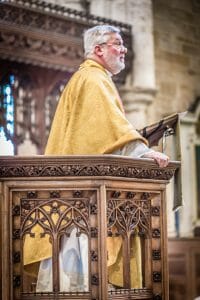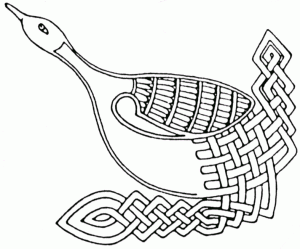A Reflection for Pentecost Sunday from Fr Paul
Fr Paul’s Reflection for Pentecost Sunday 2020
This weekend we celebrate Pentecost Sunday, and did you know that when St Peter preached that first Pentecost Sunday, he converted three thousand people, but what is even more fantastic is the fact that the sermon lasted only 3 minutes!!! This reminds me of the story of an old and wise priest whose church was a little short of money, so one beautiful Pentecost Sunday morning, the wise old priest announces to his congregation, ‘My good people, I have here in my hands three Pentecost sermons……
A £100 sermon that lasts just less than five minutes
A £50 sermon that lasts just over fifteen minutes
And a £20 sermon that lasts a full hour.
Now he said, we’ll take the collection and depending on how much we take, I shall see which sermon I shall preach to you? Don’t worry, I shall certainly not be trying this in Holy Trinity. But now to more serious matters.

We cannot see the Holy Spirit. So throughout the centuries writers and artists have struggled to come up with an adequate image to represent the Spirit. The evangelists had an idea. At Jesus’ baptism they represented the Spirit descending upon Him in the form of a dove. The image of the dove has been widely accepted. Most works of Christian art represent the Spirit as a white bird floating in the sky. Throughout the middle ages there was a custom that on the feast of Pentecost hundreds of white doves would be released from church steeples. This custom continued until people realized that the cleanup for the doves was as extensive as its symbolism. The dove is graceful, gentle, and seductive. These are qualities of God’s Spirit, but they certainly are not all of them. The dove is an incomplete image, perhaps too sweet and sentimental.

The Irish had another idea. In the old Celtic tradition the Holy Spirit was not represented as a gentle dove. It was pictured—get ready for this—as a wild goose. Now geese are very different than doves. They are uncontrollable and their honk is wild and obtrusive. They have a habit of biting those who try to contain them. They always travel in flocks and their attitude is such that farmers routinely use geese as a kind of watchdog. This is perhaps why the Celts thought that the goose would be a good symbol for God’s Spirit. For the Spirit comes into our lives not in quiet complacency, but demanding to be heard. Its message is not attractive to many. It calls us to respect one another and to travel as a group. And those upon whom the Spirit descends become noisy, passionate, courageous people who are guardians of the gospel.
Pentecost is the wild goose of a man like St. Patrick, who risked his life to evangelize the Emerald Isle. It is a Francis Xavier, who traveled to China and died there in order to spread the gospel. It’s a Father Damien who gave his life for the lepers of the Hawaiian island of Molokai. The wild goose of Pentecost is the Franciscan Friar Maximilian Kolbe who gave his life in place of another man in the death camp Auschwitz, it is the brave person who is the whistle blower on a very corrupt situation at work, it is the dedicated Meals on Wheels driver, the regular hospital visitor, it is the mothers organizing themselves against drunk driving to halt other senseless deaths of young people, it is college students giving a year of their life in some Volunteer group in Africa.
Those on whom this brash Spirit descends become noisy advocates for truth and justice: advocating health care reform, running drug addiction rehabilitation programs, helping people find jobs, trying to make a difference in the world. The Spirit of God does not come into our world to preserve the status quo. God’s spirit insists that wrongs must be righted; that justice must be done.
So what would happen to us if we in Holy Trinity all opened our hearts and let this wild goose of the Spirit in?
We need to claim this wild and uncontrollable goose because it is all too easy to domesticate God’s Spirit. It is all too easy to live day to day seduced by the quiet, lulling, and cooing of our own comfort. Every once in awhile we need to hear that wild honk that calls us back to the original message of Jesus which demands responsibility and justice, which insists that we stand up for ourselves and for others. We must be startled by that Spirit squawk that reminds us that whatever we do for the least of our brothers or sisters we do for Christ.
All in all, I think the Celts had it right. Pentecost is a Feast of Geese, wild, dirty, loud geese, honking the gospel, biting those who would oppress the weak, insisting that we travel together in worship and in service; geese that challenge our comfortable Christian coziness and remind us that we have dignity and that we must fight for the widow and the orphan; geese whose song expresses the truth so well voiced in the Letter of James that “faith without works is dead.”
Happy Pentecost, but be careful and watch out for the Wild goose!
